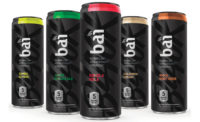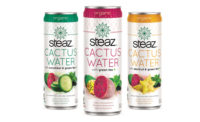Irving Plant Adds Room for Growth
At Dr Pepper/Seven Up Bottling Group’s Irving, Texas bottling plant it’s easy to see President and Chief Executive Officer Jim Turner’s management philosophy at work, and with new construction underway, it’s also easy to see how the company is planning to forge ahead, even after his retirement.
“I have made an effort to keep myself in front
of every employee,” says Turner. “You can’t be there as
often as I’d like, but on one occasion or another, I’ve been to
every single location — more than 101 locations — and I try to
get to know the employees by their first names.”
John Hall, senior vice president of operations, says
that philosophy is evident in the way the plants are run. “Jim is
just as comfortable making decisions on improvements to production lines as
he is making decisions on marketing issues, and that’s unusual these
days. He understands operations, and to me, that’s a huge benefit.
“He’s the consummate entrepreneur, the
type of businessman that really is responsible for a lot of success of
bottlers in the business,” he says.
The Irving plant was built in 1977, and originally
measured about 300,000 square feet. The plant was among the first that
Turner bought when he founded the bottling group in 1985. With a new
addition last year that added 113,000 square feet of warehouse space, and
another 58,000 square feet of production space that was scheduled to be
complete this month, the plant is continuing to add capacity and
efficiency.
In all, the plant houses eight production lines for
carbonated soft drinks, Deja Blue purified water, and bag-in-box systems.
Annual production is about 48 million cases, and the plant handles 400
SKUs. Products include most of the Cadbury Schweppes Americas Beverages
products such as Dr Pepper, 7 UP, Sunkist, A&W, RC, Canada Dry, Squirt
and Welch’s soft drinks. It also bottles Big Red for Waco,
Texas-based Big Red Inc. and Sunny Delight under contract, and is a
distribution center for products such as Snapple, Hansen’s and
Rockstar energy drinks.
Located in a particularly strong soft drink market,
production in Irving mainly serves the immediate Dallas/Ft. Worth area.
Some products also are shipped to the Houston and San Antonio areas. The
facility is a sales and distribution center as well as a bottling plant,
creating a close relationship that facilitates planning.
“We have a good
relationship with sales so we have good forecasting, which helps,
especially when you have this many flavors,” says Hall. “We
also have good information systems that give us accurate average daily
sales inventory.”
Company loyalty also pays off in the planning and line
changeover process, as veteran plant personnel are able to work quickly and
efficiently. “We probably have an average experience [level] of 20
years of people in the production area; a lot of longtime employees,”
says Hall. “So the changeover process is as efficient as it can be
right now.”
Several of the production lines are dedicated to
certain products or packages. For example, the plant has one line that runs
only 12-ounce longneck glass bottles, and because of strict water bottling
requirements, it has a line dedicated to Deja Blue bottled water. Other
lines can accommodate a variety of products and packages.
While most product is packaged in cans or PET, the
plant maintains the 12-ounce glass line as a customer preference, and often
uses it for promotional purposes. For example, it recently produced a
commemorative bottle for the Cotton Bowl on that line. The 60-valve filler
runs at a speed of 400 bottles per minute.
Three lines bottle PET packages for carbonated soft
drinks in a number of sizes and configurations. A line dedicated to 2-liter
bottles fills and caps 200 bottles per minute, and on the other two PET
lines, the plant produces 10-ounce bottles at 600 bottles per minute,
20-ounce and half-liter bottles at 500 per minute, and 1-liter bottles at
300 per minute.
All bottles arrive at the plant pre-labeled, with the
exception of 2-liter packages. After filling, the single-serve sizes are
packaged in loose packs, six-packs, and the new 12-ounce Cool Pack
refrigerator multipack.
Can filling occupies two production lines that fill
and place lids at a rate of 1,400 cans per
minute. After filling, the cans are configured into six-, 12-, 15- and
20-pack secondary packaging.
The plant has a water treatment center for Deja Blue,
a reverse-osmosis treated product. The filling
line for Deja Blue is the plant’s newest, and the 80-valve filler
runs at a rate of 470 to 800 bottles per minute. The line produces
half-liter and 1-liter PET bottles in both loose-pack and six-pack
configurations, as well as 12-ounce, 20-ounce and 1.5-liter sizes.
Materials arrive at the plant through 18 raw materials
docks, which feed seven depalletizers. Each of the production lines has its
own depalletizer, which unloads pallets of bottles onto the lines. After
filling and secondary packaging, they return to an area close to the
depalletizers to be re-palletized for shipping. Because of their high
filling speeds, a third palletizer serves the two can filling lines. The
other lines each have one palletizer.
Dr Pepper/Seven Up Bottling Group owns the fleet of
trucks that serve the plant, which are primarily side-loaded trailers for
direct store delivery. It has onsite maintenance for the truck fleet as
well as an onsite forklift shop. It also has a recycling center located on
the 40 acres that make up the plant property.
The newest space in the plant has become a staging and
loading area for advance-sales routes — accounts such as convenience
stores and mom-and-pop stores. The area
includes staging where full pallets of product are dismantled and mixed according to customer orders. Another 23-dock
loading area is used for bulk grocery delivery.
With all of the production and sales activity buzzing
around the Irving plant, it’s clear the company will continue to
serve the Dallas area long after its founder has stepped aside. But Hall
says his absence will be felt. “People respect him unbelievably
here,” he says. “When Jim comes out here, he knows every
employee on the floor, he knows their families, knows their spouses by
name. It’s kind of a running joke — at least I hope it is
— that a lot of people say ‘Mr. Turner, when you retire,
I’m retiring, too.’ They think that much of him.” BI


